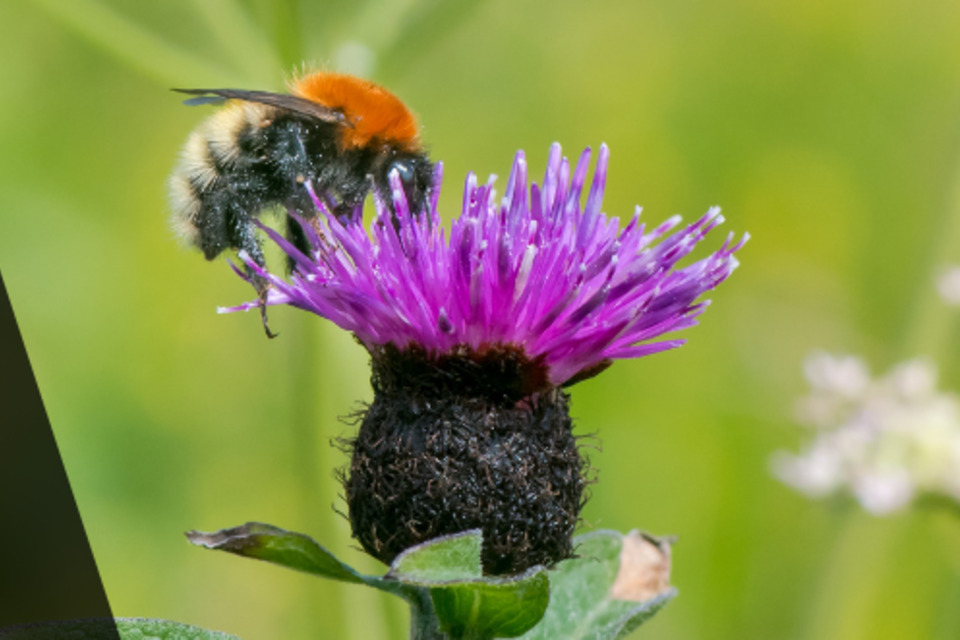Bees’ Needs Week
Updated 19 January 2026
Applies to England

We know that bees, and other pollinating insects, are an essential part of our environment and play a crucial role in food production.
Bees, like the one pictured collecting nectar from a purple flower, play a vital role in pollination and biodiversity.
Defra works in partnership with many organisations and partners to help our precious pollinators survive and thrive.
Everyone has a part to play to encourage more beautiful butterflies and buzzing bees in your local area. We can all take simple steps to protect our pollinators and help to restore our natural world.
Bees’ Needs Week 2026: 13 to 19 July
Bees’ Needs Week is an annual event run by Defra, working with a range of organisations including conservation groups, businesses and charities.
The aim of the week is:
- to raise awareness of the importance of bees and other pollinators
- share ideas, actions and activities that highlight the ways in which everyone can help them thrive
We’d love as many people and organisations as possible to get involved.
If you want to take part, email beesneeds@defra.gov.uk. For media enquiries, contact the Defra press office on 020 8225 7318.
You can download a free promotional pack, whether you are planning an event or simply want to help spread the word.
The pack includes:
- a poster showing 5 simple actions you can take to help pollinators
- a blank event poster you can customise to promote your own Bees’ Needs Week activities
- activity sheets for children
Five simple actions
There are 5 simple actions that anyone can take to help pollinators:
- Grow more nectar rich flowers, shrubs and trees. Using window or balcony boxes are good options if you do not have a garden.
- Let patches of garden and land grow wild.
- Cut grass less often.
- Do not disturb insect nests and hibernation spots.
- Think carefully about whether to use pesticides.
Flower-insect timed (FIT) counts
This year, you can also get involved with invaluable citizen science.
All you need to do is simply spend 10 minutes watching flowers and insects in good weather. FIT counts can be done anywhere, including gardens and parks in warm, dry weather, any time from April to September.
Every single count submitted to the UK Pollinator Monitoring Scheme (PoMS) helps make our data more meaningful, to help us learn more about where pollinators live and how their numbers are changing.
Read the PoMS instructions for FIT counts and help us help pollinators!
Bees’ Needs champions
Each year we celebrate Bees’ Needs champions. The awards recognise and celebrate examples of exceptional initiatives undertaken by local authorities, community groups, farmers, businesses and individual people to support pollinators. Whether that’s creating a wildflower patch, educating the local community about pollinators, or taking special measures on your farm.
Applying for a Bees’ Needs champion award 2026
Applications for our next round of Bees’ Needs Champion Awards are now open.
2025 Bees’ Needs champions
In 2025, we had 23 Bees’ Needs champions. These awards went to people and organisations who have taken inspiring action, however big or small, to benefit pollinators.
Our 2025 Bees’ Needs champions were:
- Beckhill Community Garden
- Bedford Borough Council
- Bellrock Group - Woodside Industrial Estate
- Blenheim Palace and Rowse Honey
- Canny Plants at Scotswood Garden
- Canterbury Oast Trust
- Cliffe Castle Park Keighley
- Congleton War Memorial Hospital Wellbeing Garden
- Coventry University
- Erdington Litter Busters (ELB)
- Flying Flowers UK
- Hazlerigg Parish Council
- Heart of Worcestershire College
- HMP Eastwood Park Prison
- Keynsham Girl’s Brigade
- Knutsford Town Council
- Stirling Park
- The Showground ‘Countryside Area Volunteers’ for the Newbury & District Agricultural Society
- Thistly Meadow Primary School
- University of Sussex
- Weston Industrial Estate
- White Post Farm
- Wirral Country Park
